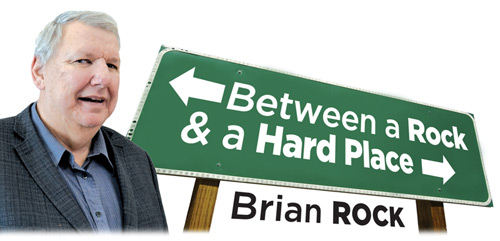BETWEEN A ROCK AND A HARD PLACE
Is There Anything At All in Bill 96
Anglophones and Allophones Support?

The answer to that question is surprisingly yes, especially when you consider the formidable opposition to this proposed legislation led by two English rights groups in the province.
The long-established Quebec Community Groups Network is led by its President - the Honourable Marlene Jennings, retired lawyer and former senior public servant, and ex-Liberal Member of Parliament for Notre Dame de Grace- Lachine in Montreal. She is well known as the first Black woman to be elected to Parliament from the province of Quebec, and for her Jennings Report and Recommendations from the Election Systems Study Panel that she chaired some six years back.
The newcomer on the block is the Task Force on Linguistic Policy created earlier this year and ably led by Me. Colin Standish, an up-and-coming young lawyer from the Eastern Townships, who has surrounded himself with a Steering Committee of six able community activists and an Executive Committee of some thirty individuals prominent in the fields of municipal politics, law, education, community involvement, among others.
We have already heard over the past months what Anglophones and Allophones oppose in the sections of Bill 96.
However, the crafters of Bill 96 did include something Anglophones and Allophones like, even though we recognize the Coalition avenir Quebec legislators did borrow (steal) it from the private members bill of Mr. Gregory Kelley, Liberal Member of the National Assembly for Jacques-Cartier on the West Island of Montreal:
. “88.10. Any person domiciled in Québec who is unable to communicate in French is invited, as far as he is able, to learn French in order to use it as the common language to be able to interact, thrive within Québec society and participate in its development.
“88.11. Francisation Québec shall provide French language learning services to persons domiciled in Québec who are not subject to compulsory school attendance under the Education Act (chapter I-13.3). Those services must enable such persons to acquire sufficient skills to use French as the common language. Francisation Québec shall provide such services, among other things, to persons who are unable to communicate in French and who are employed by an enterprise referred to in section 149 or an enterprise employing fewer than five persons
It must be pointed out that the Regional Association of West Quebecers led the way provincially in offering such courses to Anglophones and Allophones in the Outaouais over the last four years, at times having waiting lists of almost three hundred members patiently waiting for places. Former RAWQ Executive Director Mr. Linton Garner was lauded for arranging to secure grants from the Ministry of Municipal Affairs and Housing of Quebec to enable the offering of these free French language courses in Aylmer, Shawville, and Wakefield.
As we patiently await the statistics from the 2021 federal census, we can take solace in the numbers that continually increase from census to census showing that in 2016, StatsCan reported: 69% of Anglophones in Quebec could have a conversation in both English and French, and more surprisingly, that 40 % of Francophones in Quebec could also converse in both French and English.
• “One language sets you in a corridor for life. Two languages open every door along the way.” -Frank Smith.
• Frank Smith (1928-2020) was a Canadian psycholinguist recognized for his contributions in linguistics and cognitive psychology

